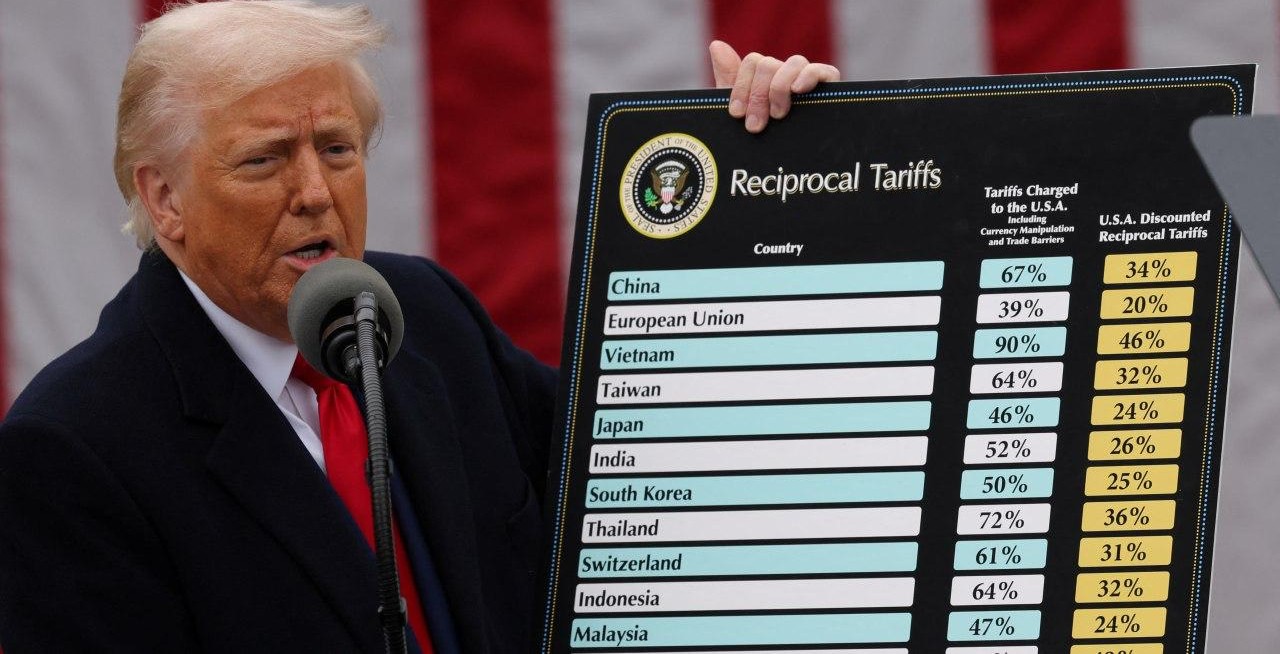Donald Trump’s ill-advised tariff spree includes a 24% reciprocal tariff on Malaysian imports into the U.S., which has been met with widespread criticism and concerns over its economic impact on Malaysia’s export-driven sectors.
In a move that has sent shockwaves through global markets, U.S. President Donald Trump announced on April 2, 2025 a sweeping range of new “reciprocal tariffs,” including the imposition of a 24% levy on Malaysian imports, set to take effect on April 9. This decision is part of a broader strategy to address what the Trump administration perceives as longstanding trade imbalances and to promote domestic manufacturing.
The Trump administration’s views, however, are not shared by leading economists – nor business leaders – and Trump is facing serious criticism both at home and abroad for inciting what most see as a wholly unnecessary trade war.
Trump has framed these tariffs as a necessary response to protect American industries and rectify unfair trade practices. During the announcement, he emphasized the need for “reciprocal tariffs” to counteract the duties that other nations impose on U.S. goods. The administration argues that such measures are essential to rebuild the U.S. manufacturing sector and reduce the national debt.
In his announcement, Trump declared a 10% baseline tax on imports from all countries and even higher tariff rates on dozens of nations that run trade surpluses with the United States. He held up a chart while speaking at the White House, showing the U.S. would levy a 34% tax on imports from China, a 20% tax on imports from the European Union, and 32% on Taiwan. Malaysia’s tariff was set at 24%.
However, recent polling has shown that a strong majority of Americans not only disapprove of Trump’s handling of the U.S. economy as a whole, but are expressing real concern over the negative impacts of his unpopular tariff policies. As of April 2, 2025, President Trump’s approval rating declined to 43%, the lowest since his return to office. This drop is partly attributed to widespread discontent over his tariff policies, with only 37% of those polled approving of his economic management and just 30% supporting his actions on inflation.
Media outlets and businesses ranging from MSNBC to The Wall Street Journal and JP Morgan have also blasted the Trump tariffs as foolish, unnecessary, and likely to plunge the country into a recession. Even leaders in Trump’s own party have spoken out against the tariffs, marking a rare instance in which Trump has been publicly rebuked by Republicans.

POLAR BEARS AND PENGUINS AFFECTED, TOO
Drawing widespread mockery of the Trump administration’s incompetence was the tariff policy’s inclusion of several tiny islands worldwide, including some with no human population – only penguins.
MSNBC’s Rachel Maddow was particularly sharp-tongued in her scathing takedown of Trump’s ignorance.
“May I introduce you to Jan Mayen Island?” she began acerbically. “It is a volcano, volcanic island, mostly covered in glaciers, hundreds of miles from anything else in the Arctic Ocean… it does have an airstrip, but nobody lives there. Population: zero humans — many polar bears.

“Rest assured, we, the American people, are now protected from the predatory economic piracy of that uninhabited island,” Maddow continued sarcastically. “Thanks to our genius strongman ruler who has put the American government to work. Donald Trump has just slapped a 10 percent tariff on Jan Mayen Island, just in case anyone ever moves up there and tries to screw us over with their Jan Mayen Island under-priced exports and stuff.”
But even that’s not the end of it, Maddow said, because Trump also put a tariff on Heard Island and McDonald Islands, on the near-opposite side of the world near Antarctica.
“[These islands] are only reachable by boat, and it takes two weeks by sea to get there from Australia,” explained Maddow. “They’re totally uninhabited. Both of them. They’re also active volcanoes. So, even if you wanted to move there, even the penguins might caution you. Right? But they’re active volcanoes. One on each island, on both Heard and McDonald Islands.”

Sliding into full-bore mockery, Maddow wrapped up: “I will say those volcanoes and the penguins and seals who live there, they will never menace the American economy again, as they have in the past, by flooding us with with their cheap exports of what? Like fresh air, cool breezes, a waft of eau de penguin, I don’t know… what do they send us? The uninhabited Antarctic volcanoes of Heard and McDonald islands were just slapped by Donald Trump today with a steep 10 percent tariff.”
POTENTIAL IMPACTS ON MALAYSIA
Closer to home, the imposition of a 24% tariff is poised to have significant repercussions for Malaysia’s export-driven economy. The United States is a key trading partner, and such a substantial tariff could lead to decreased competitiveness of Malaysian products in the U.S. market. Industries that are heavily reliant on exports to the U.S. are likely to be the most affected.

Several sectors within Malaysia are particularly vulnerable to these new tariffs:
- Semiconductor Industry: Malaysia’s semiconductor sector, a significant contributor to the national economy, could face reduced demand from U.S. clients due to increased costs. This industry has been a cornerstone of Malaysia’s industrial growth, and any downturn could have widespread implications.
- Automotive Parts: Producers of automotive components may experience a decline in orders from U.S. manufacturers seeking more cost-effective suppliers.
- Palm Oil Products: As a leading exporter of palm oil, Malaysia might see a decrease in exports to the U.S., affecting both large-scale producers and smallholders.
- Electrical and Electronics (E&E): This sector, encompassing a range of consumer electronics, could suffer from reduced competitiveness in the U.S. market.
DOMESTIC AND REGIONAL RESPONSES AND ECONOMIC IMPLICATIONS
The announcement has elicited a range of reactions both domestically and internationally. In Malaysia, political leaders and industry representatives have expressed concern over the potential economic fallout. There are calls for the government to engage in diplomatic negotiations to seek exemptions or reductions in the tariff rates.
On the international stage, other Southeast Asian nations facing similar tariffs are also voicing apprehension. Countries like Vietnam and Indonesia, subjected to tariffs of 46% and 32%, respectively, are evaluating their trade strategies in response to the Trump administration’s measures.
In the immediate wake of Trump’s announcement, Asian shares dropped, and markets around the world were rocked. Financial markets around the world have been shaky lately, largely because of uncertainty about Trump’s on-again, off-again trade war. Against broad criticism that he has no understanding of tariffs, Trump has said he wants them implemented to make the global system more fair and to “bring manufacturing jobs” back to the United States from other countries. But tariffs also threaten to grind down growth for the U.S. and other economies, all while contributing to worsening inflation

Indeed, many economists warn that these tariffs could have far-reaching consequences beyond the immediate industries affected. There is potential for increased inflation in the U.S. as import costs rise, which could, in turn, dampen consumer spending. Globally, the move may trigger retaliatory measures, leading to a possible escalation into broader trade conflicts. Such developments could disrupt international supply chains and hinder global economic growth.
As the tariffs take effect, Malaysian businesses are advised to explore diversification strategies, both in terms of markets and product offerings, to mitigate the impact of the tariffs. The Malaysian government is likely to intensify diplomatic efforts to address the issue, potentially seeking alliances with other affected nations to present a unified front in trade negotiations.
While the Trump administration’s tariffs are framed as a move toward economic fairness, the immediate and long-term impacts on Malaysia could be substantial. The coming months will be critical in determining how Malaysia navigates these challenges and what measures can be implemented to safeguard its own economic interests.
"ExpatGo welcomes and encourages comments, input, and divergent opinions. However, we kindly request that you use suitable language in your comments, and refrain from any sort of personal attack, hate speech, or disparaging rhetoric. Comments not in line with this are subject to removal from the site. "

















